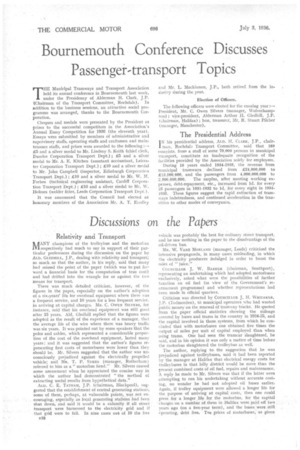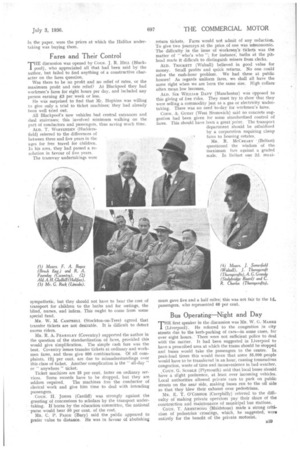Discussions on the Papers
Page 48

Page 49

If you've noticed an error in this article please click here to report it so we can fix it.
Relativity and Transport
MANY champions of the trolleybus and the motorbus respectively had much to say in support of their particular preferences during the discussion on the paper by Ahn. GLEDHILL, J.P., dealing with relativity and transport; so much so that the author, in his reply, said that many had missed the point of the paper. (which was to put forward a financial basis for the computation of true cost) and had drifted into the wrangle for or against the two means for transport.
There was much detailed criticism, however, of the figures in the paper, especially on the author's adoption of a six-years' life for overhead equipment where there was a frequent service, and 10 years for a less frequent service, in arriving at capital charges. MR. C. OWEN SILVERS, for instance, said that his overhead equipment was still good after 15 years. Aid. Gledhill replied that the figures were adopted as the result of the experience of a manager, that the average life of the wire where there was heavy traffic was six years. It was pointed out by some speakers that the poles and cables, which represented a considerable proportion of the cost of the overhead equipment, lasted many years ; and it was suggested that the author's figures representing first costs of motorbuses were lower than they should be. Mr. Silvers suggested that the author was unconsciously prejudiced against the electrically propelled vehicle; and Ma. T. P. SyKES (manager, Rotherham) referred to him as a" motorbus fiend," Mr. Silvers caused some amusement when he appreciated the concise way in which the author had demonstrated " the method of extracting useful results from hypothetical data."
ALL/. C. E. TATHAM, J.P. (chairman, Blackpool), suggested that the establishment of central generating stations, some of them, perhaps, at vulnerable points, was not encouraging, especially ax local generating stations had been shut down, and said it would be a calamity if all street transport were harnessed to the electricity grid and if that grid were to fail. In nine cases out of 10 the free
538 vehicle was probably the best forordinary street :transport. and he saw nothing in the paper to the disadvantage of the oil-driven bus.
Ma. W. VANE MORLAND (manager, Leeds) criticized the intensive propaganda, in many cases misleading, in which the electricity producers indulged in order to boost the sales of " juice."
COUNCILLOR J. W. BARBER (chairman, Southport), representing an undertaking which had adopted motorbuses exclusively, asked what were the possibilities of further taxation on oil fuel (in view of the Government's rearmament programme) and whether representations had been made In official quarters.
Criticism was directed by COUNCILLOR J. H. WHITAKER. J.P. (Todmorden), th municipal operators who had wasted public money on the renewal of tramway tracks. He quoted from the paper official statistics showing the mileage covered by buses and trams in the country in 1934-35, and the capital involved in those systems, from which he concluded that with motorbuses one obtained five times the output of miles per unit of capital employed than when using trams. One had seen the tramcar slaughtered, he and in his opinion it was only a matter of time before the motorbus slaughtered the trolleybus as well.
The author, replying tothe suggestion that he was prejudiced against trolleybuses, said it had been reported by the manager at Halifax that electrical energy costs for trolleybuses in that hilly district would be more than the present combined costs of oil fuel, repairs and maintenance. A reply he made to Mr. Silvers was that if the latter were attempting to run his undertaking without accurate costing, no wonder he had not adopted oil buses earlier. Again, if trolley equipment were allowed a longer life for the purpose of arriving at capital costs, then one could press for a longer life for the motorbus, for the capital charges on a number of them in Halifax were paid off two years ago (on a five-year term), and the buses were still operating, debt free. Tee prices of motorbuses; as given
in the paper, were the prices at which the Halifax undertaking was buying them.
Fares and Their Control
THE discussion was opened by COLIN. J. R. HILL (Blackpool), who appreciated all that had been said by the author, but failed to find anything of a constructive character on the fares question.
Was there to be no profit and no relief of rates, or the maximum profit and rate relief? At Blackpool they had workmen's fares for eight hours per day, and included any person earning £3 per week or less.
He was surprised to find that Mr. Hopkins was willing to give only a trial to ticket machines; they had already been well tried out.
All Blackpool's new vehicles had central entrances and dual staircases; this involved minimum walking on the part of conductors and passengers, thus saving much time.
ALD. T. WOFFENDEN (Huddersfield) referred to the differences of between three and five years in the ages for free travel for children. In his area, they had passed a resolution in favour of five years.
The tramway undertakings were sympathetic, but they should not have to bear the cost of transport for children to the baths and for, outings, the blind, nurses, and infirm. This ought to come from some special fund.
MR. W. M. CAMPBELL (Stockton-on-Tees) agreed that transfer tickets are not desirable. It is difficult to detect excess riders,
MR. R. A. FEARNLEY (Coventry) supported the author in the question of the standardization of fares, provided this would give simplification. The simple cash fare was the best. Coventry issues transfer tickets at ordinary and workmen fares, and these give 600 combinations. Of all complaints, l21 per cent. are due to misunderstandings over this class of ticket. Another complication is the " all-day " or " anywhere" ticket.
Ticket machines are 25 per cent, faster on ordinary services. Some records have to be dropped, but they are seldom required. The machines free the conductor of clerical work and give him time to deal with intending passengers.
• COUN. H. Jorots (Cardiff) was strongly against the granting of concessions to scholars by the transport undertaking. If borne by the education committee, the national purse would bear 50 per cent, of the cost.
MR. C. P. PAIGE (Bury) said the public appeared to prefer value to distance. He was in favour of abolishing return tickets. Fares would not admit of any reduction. To give two journeys at the price. of one was uneconomic. The difficulty in the issue of workmen's tickets was the matter of " who's who "; for instance; baths at the pithead made it difficult to distinguish miners from clerks.
As. DUCKETT (Walsall) believed, in good value for money. Small profits and quick returns. No one could solve the rush-hour problem. We had these at public houses! As regards uniform fares, we shall all have the same right when we are born the same size. High collars. often mean low incomes. '
ALI). SIR WILLIAM DAVY (Manchester) was opposed to this giving of free rides. They must try to show that they were selling a commodity just as a gas or electricity undertaking. There was no need' to-day for workmen's fares. Come. A. GUEST (West Bromwich) said no concrete suggestion had been given for some standardized control of fares. This should have been a great point. The transport department should be subsidized by a corporation requiring cheap fares to housing estates.
MR. R. MCCREARY (Belfast) questioned the wisdom. of the maximum fare against a graded scale. In Belfast one 2d. maxi mum gave five and a half miles; this was not fair to the IA., passengers, who represented 68 per cent.
Bus Operating—Night and Day
THE first speaker in the discussion was MR, W. G. %talcs (Liverpool). He referred to the congestion in city streets due to the kerb-parking of cars—in some cases, for over eight hours. There were not sufficient police to deal with the matter. It had been suggested in Liverpool to have a prescribed area at which the trams should be stopped and buses would take the passengers to the centre. In, peak-load times this would mean that some 35,000 ,peopIe would have to be transferred in an hour, causing tremendous congestion, waste of time and inconvenience in bad weather.
COON. G. SCOBLE (Plymouth) said that local buses should have a slight preference, at least over incoming vehicles. Local authorities allowed private cars to park on public streets on the near side, making buses run to the off side so that the blew their exhaust over pedestrians.
MR. E. T. O'Colorou (Caerphilly) referied . to the difficulty of making private operators pay their share of the construction and maintenance of municipal bus stations.
CouN. T. ARMSTRONG' (Maidstone) made a strong criticism of pedestrian cress:rigs, which, he suggested, were entirely for the benefit of the private motorist.




















































































